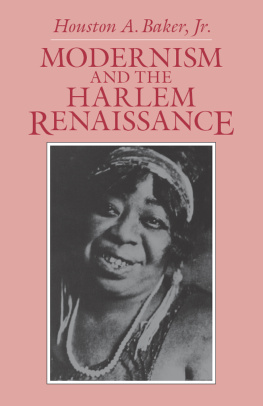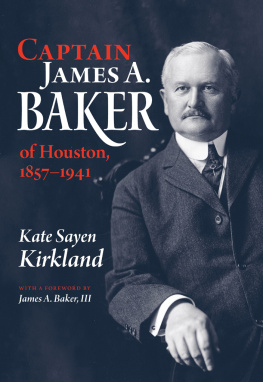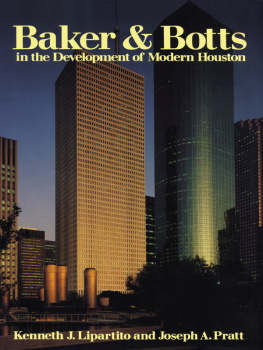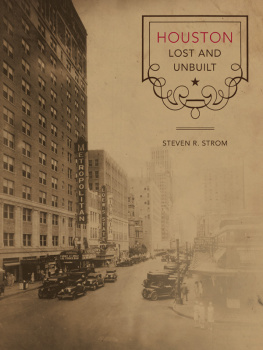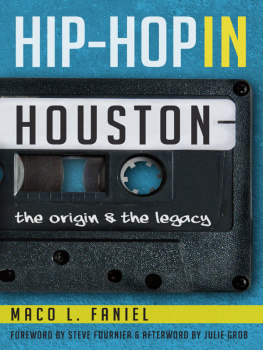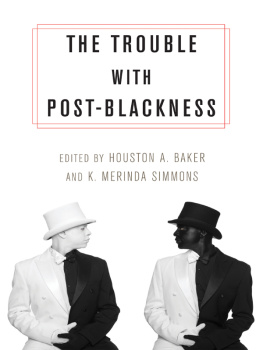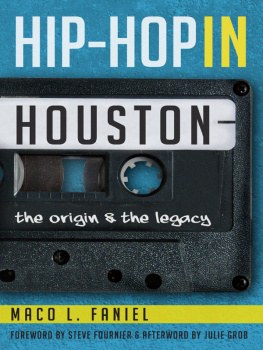
were previously published in Gina Dent, ed., Black Popular Culture (Seattle: Bay Press, 1993); portions of chapter 4 were published, in an earlier form, in Constance Penley and Andrew Ross, eds., Technoculture (Minneapolis: University of Minnesota Press, 1991).
The University of Chicago Press, Chicago 60637
The University of Chicago Press, Ltd., London
1993 by Houston A. Baker, Jr.
All rights reserved. Published 1993
Paperback edition 1995
Printed in the United States of America
02 01 00 99 98 97 96 95 2345
ISBN: 0-226-03520-4 (cloth)
ISBN: 0-226-03521-2 (paper)
ISBN: 978-0-226-16733-6 (ebook)
Library of Congress Cataloging-in-Publication Data
Baker, Houston A.
Black studies, rap, and the academy / Houston A. Baker, Jr.
p. cm.(Black literature and culture)
1. Afro-AmericansStudy and teaching (Higher) 2. Afro-AmericansEducation. 3. United StatesPopular culture. 4. Rap (Music)History and criticism. I. Title. II. Series.
E184.7.B3 1993
973.049607300711dc20
92-42997
CIP

The paper used in this publication meets the minimum requirements of the American National Standard for Information SciencesPermanence of Paper for Printed Library Materials, ANSI Z39.48-1984.
BLACK STUDIES RAP AND THE ACADEMY
HOUSTON A. BAKER, JR.
The University of Chicago Press
Chicago and London
Black Literature and Culture A Series Edited by Houston A. Baker, Jr.
The primary focus of Unity Weekend celebrations over the past twelve years has been the familya rededication of family values, morals, and social interaction. The Unity experience was born in 1978 as the need for family reunification became a pressing concern to the management of WDAS AM/FM. Over the years it has grown from 50,000 in attendance to last years record-setting 800,000.
From the Unity Day marketing brochure of the sponsor of the celebration, a Black Philadelphia Radio Station
Let the beat hit em,
Let the music take control!
CONTENTS
PREFACE
The present essay is the result of a short-term visiting fellowship at Princeton University. Professor Arnold Rampersad of American Studies and Professor Victor Brombert of the Council of the Humanities graciously invited me to present lectures as a Whitney J. Oates Fellow during the spring of 1992. My topic was the relationship between black urban influences and the formation of Black Studies during the 1960s; I was concerned as well with the relationship of one contemporary form of black urban culture, namely rap music and poetry, to contemporary black academics. The guiding idea of my reflections was the coextensiveness of inside and out in the actual process of Black Studies founding. This idea was expanded to include the interrelations between the outside expressive cultural energies of todays black urban youth and contemporary scholars inside the academy. If my understanding of contemporary cultural studies is correct, considerations of such inside/outside negotiations constitute part of that projects work.
But I do not wish to make grandiose claims for the reflections that follow. They are not meant as local recapitulations of global intellectual work from Gramsci and Adorno, through Williams and Hebdige, gathering steam from Birmingham and Champaign-Urbana in the process. Rather, they are designed as re-vocabularizations, resettings, and expansions, as it were, of inside/outside scholarly and creative energies that have mightily influenced the American academy during the past two and one half decades. They represent merely a single installment on a large debt to be paid to the past and a modest analytical investment in Black Studies futures. Finally, they offer a critique of what seems to be a compromising moment in a worthwhile mission begun many years ago. They conclude with a sounding of rap that suggests a possible model of appreciation and understanding for tomorrows Black Studies scholars.
My thanks are extended, as always, to my wife Charlotte Pierce-Baker, who has been a gracious and astute critic of this project from its inception. And though all thanks do not remain in the family, a healthy share of my gratitude belongs to my son Mark Frederick Baker, who worked as a truly remarkable research assistant in shaping this project. Ruth Lindeborg and Joann Hippolyte also provided research assistance.
Professor Manthia Diawara read portions of the manuscript and provided excellent suggestions for improvement. Audiences at Princeton, Purdue, Kenyon, Amherst, and Dickinson all offered extremely profitable responses and corrections. Finally, a word of profound gratitude goes out to all the cultural workers who brought the noise that launched the Black Studies project. And peace to the rappersthe black poets of the contemporary urban scene, who at times seem to be the last voices in America talking bravely back and black in these new times.
BLACK STUDIES: A NEW STORY
The single task that I set myself for the summer of 1991 was an essay on Black Studies and the institution of English. I was less certain about English in its daily, postmodern unfoldings than I was about Black Studies, for who can ever be certain what is happening at Duke? By contrast, everyone knows the familiar story of Black Studies. It is a narrative of Hagars children redeemed from exile by the grace of affirmative action and the intentionality of Black Power. It is a vernacular tale, resonant with rhythm and blues. And it has been relegated in recent years to the briefest imaginable space in the encyclopedia of postmodern American academics. Thus it was that, in the summer of 1991, I wanted to construct a Black Studies account that would produce, perhaps, a conclusion rather different from Negroes also spoke. I hoped, in short, to avoid soul narration.
A number of factors converged, however, to make my job more complicated than I had envisioned. First, the currents of the PC (Political Correctness) Cavaliers were swirling, during the summer of 1991, with the energy of Edgar Allan Poes maelstrom. Everywhere one turned, after the Modern Language Association opposed the nomination of Carol Iannone to the National Council on the Humanities, there were editorials and op. ed. meditations denouncing a new leftism of tenured radicals in the American academy. Professors who suggested that Alice Walker might conceivably form part of a course devoted to American literature were held to be equivalentin the bizarre logic of the PC Cavaliersto Ku Klux Klanspersons. (Dont ask me to explain it.) And in the economies of the PC Cavaliers, Black Studies was just one more roundheaded carryover from the chaotic 1960s, when mere anarchy was loosed in halls of ivy. Like other interdisciplinary area studies (e.g., Womens Studies) to which it lent force, Black Studies was suddenly being held accountable for a new McCarthyism. (Again, dont ask me to explain itat least not yet.)
There thus seemed to be at least two incumbencies if I were going to achieve a new and different story. I would certainly have to account for the new politics of PC by, at least, re-vocabularizing the familiar Black Studies tale to avoid its easy imbrication in a simpleminded, right-wing rhetoric of denunciation. Second, since Black Studies was founded as a social, scholarly, and pedagogical enterprise to deal with black culture, I would have to account for the relationship of such studies to black urban culture. Black urban culture, I believe, provided much of the impetus for Black Studiess founding, and surely in our own era, it is the locus of quite extraordinary transnational creative energy.


 The paper used in this publication meets the minimum requirements of the American National Standard for Information SciencesPermanence of Paper for Printed Library Materials, ANSI Z39.48-1984.
The paper used in this publication meets the minimum requirements of the American National Standard for Information SciencesPermanence of Paper for Printed Library Materials, ANSI Z39.48-1984.
